|
|
|
Sort Order |
|
|
|
Items / Page
|
|
|
|
|
|
|
| Srl | Item |
| 1 |
ID:
163831
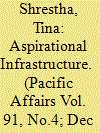

|
|
|
|
|
| Summary/Abstract |
This article contributes to the current scholarship on migration brokerage and infrastructure by revealing the contingent, experimental, and dynamic nature of recruiting work for foreign-employment recruitment agencies (FERAs) in Nepal. By situating Nepal’s migration infrastructure, or foreign employment (baidesik rojgar), within the nation’s social history and long-standing discourse on development (bikas), this paper argues for the importance of tracing the experimental character of an emergent migration infrastructure. In particular, I develop the concept of “aspirational infrastructure,” by which I mean the oft-overlooked experimental practices and practicalities that shape and direct the aspirations of those involved in foreign-employment recruitment work. The ethnography traces the intense encounter, intermediation, and interaction among the actors engaged in brokerage activities at FERA social spaces, where recruiters shape not only the social imaginaries and aspirations of potential migrants, but also their own. The recruitment work and migration brokerage rely on balancing the renewed vision and familiar discourse surrounding the “promise of livelihood,” and the reconfiguration of existing institutional norms, ultimately serving the state’s reprioritization of maintaining its “developing” status.
|
|
|
|
|
|
|
|
|
|
|
|
|
|
|
|
| 2 |
ID:
140439
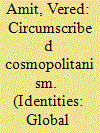

|
|
|
|
|
| Summary/Abstract |
Recent scholarly conceptualisations of cosmopolitanism have often distinguished between mundane practices on the one hand and a conscious assertion of an ethical project on the other hand. But this kind of distinction may be less a matter of the simple presence or absence of a particular kind of consciousness than of the degree of self-awareness as well as of the consonance or disjuncture between this consciousness and what can actually be realised in practice. In this article I take up some of these questions of degree and disjuncture to reflect on the interaction between aspirations and circumscribed experiences occurring among two sets of Canadian travellers: (i) consultants whose specialisation in international projects involves frequent stays abroad, and (ii) young adults who have taken up opportunities for an extended stay abroad afforded by university exchanges or working holidaymakers programs.
|
|
|
|
|
|
|
|
|
|
|
|
|
|
|
|
| 3 |
ID:
140438


|
|
|
|
|
| Summary/Abstract |
Within the interdisciplinary literature on cosmopolitanism, one particularly important distinction stands out as a recurring motif. Specifically, scholars have been concerned to distinguish between cosmopolitanism as a set of mundane practices and/or competences on the one hand and cosmopolitanism as a cultivated form of consciousness or moral aspiration on the other. For anthropologists, this distinction between aspiration and practice is often rendered ambiguous across the diverse expressions of cosmopolitanism that they encounter ‘on the ground’. This special issue therefore brings together five contributions from anthropologists who are reporting on encounters and aspirations that reveal different forms of spatial mobility, scales of commitment or risk, and are often transient, ambivalent and precarious. These are circumstances in which cosmopolitanism emerges as uneven and partial rather than as a comprehensive or unequivocal transformation of practice and outlook.
|
|
|
|
|
|
|
|
|
|
|
|
|
|
|
|
| 4 |
ID:
163836
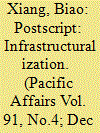

|
|
|
|
|
| Summary/Abstract |
This article explores the trend of “infrastructuralization” in state-sponsored programs of low- and semi-skilled labour migration from Asia. These programs increasingly focus on facilitating migration rather than generating actual opportunities for mobility and substantive development. While providing training to develop skills targeting specific jobs in specific countries, the programs generally leave complaints about actual working conditions and wages to be managed by the migrants themselves. In this process, labour migration programs are infrastructuralized, meaning that there is an ongoing expansion and intensification of the socio-technical platform that makes mobility possible, as facilitation becomes an end in itself. This trend is tied to changes in the general development paradigm, labour and state-citizen relations across Asia, as well as the increasing importance of brokers in facilitating connection. This article first probes a number of internal dynamics around which infrastructuralization unfolds in practice. We then highlight how commercial intermediaries and public institutions, the two key actors in infrastructuralization, shape migration by producing context-specific migrant subjectivities, making aspirational work a central element of infrastructuralization. In the conclusion, we explore research agendas that can be developed further.
|
|
|
|
|
|
|
|
|
|
|
|
|
|
|
|
| 5 |
ID:
177939


|
|
|
|
|
| Summary/Abstract |
This article explores the spectrum of violence inflicted and endured by marginalized young people in Kolkata. An unknown youth (possibly a male acquaintance encountered in the first research site in the bustees, or slum communities of Kolkata) and a young girl Shyamoli (the central character in the fictional piece set in a small town or moforshol on the outskirts of Kolkata) present a picture of the ordinary and everyday gendered and class violence experienced by girls and young women in a rapidly changing Kolkata. Collectively the two papers remind us of the aspirational politics, practices, and affective states that lead to violent outcomes in patriarchal and increasingly middle-class nationalist spaces. As fieldworkers we advocate for reflexive sensitivity and nuanced commitment to embracing contradictions and ambiguity wholeheartedly as we think through the aspirations, practices, and experiences of our interlocutors in Kolkata’s shadow zones.
|
|
|
|
|
|
|
|
|
|
|
|
|
|
|
|
| 6 |
ID:
151659
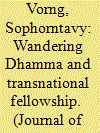

|
|
|
|
|
| Summary/Abstract |
This article compares Buddhist and Christian approaches to the drug problem among ethnic minorities in northern Thailand. Government programmes implemented through Buddhist monasteries aim to construct Buddhist subjects and realise agendas of national security in border areas. Yet, they also offer development support and access to resources. Meanwhile, gospel rehabilitation centres provide much-needed drug treatment services while drawing highlanders into transnational spheres of Christian fellowship. Consequently, I argue that the relationship between ethnic minorities and the state can be defined in terms of aspiration and negotiation, as well as resistance and evasion, as has been previously argued in the literature.
|
|
|
|
|
|
|
|
|
|
|
|
|
|
|
|
| 7 |
ID:
177057
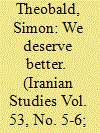

|
|
|
|
|
| Summary/Abstract |
This article argues that even as Chinese imports occupy an increasingly large percentage of the space in Mashhad’s bazaars and marketplaces, such goods are interpreted not only as being of poor quality but, critically, as insufficiently “worthy” of the Iranian middle class who positioned themselves as “deserving better.” In attempting to assess why this is the case, the article suggests that such framing both reveals much of, and requires us to consider, the pivotal role of status in Iran. It holds that this concern for status is expressed at multiple levels: that of the family, as a class, and finally, of the nation. At each of these levels of expression, it is possible to trace different post-revolutionary social phenomena. These include the reification of the family as a moral unit, major shifts in the demographics of education and urbanization, the rise of a consumer culture and the perilous decline of the fortunes of the middle class, and, finally, imaginings of national exceptionalism. This article then uses such readings of Chinese goods as a window into middle class ideologies of worth and deservingness.
|
|
|
|
|
|
|
|
|
|
|
|
|
|
|
|
|
|
|
|
|